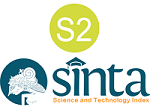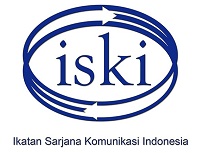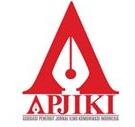Consumer Protection Agency’s crisis management for children’s kidney failure cases in Indonesia
Abstract
Background: The Badan Perlindungan Konsumen Nasional Republik Indonesia (BPKN RI) is a government institution dedicated to protect consumer rights nationwide. In August 2022, instances of kidney disorders affecting children emerged in various regions of Indonesia, necessitating BPKN’s involvement in addressing these cases. Purpose: This study examines how crisis communication factored into BPKN RI’s crisis management strategy during the 2022 outbreak of atypical progressive acute kidney injury (APAKI) in children. Methods: The theoretical framework guiding this research encompasses organizational theory, corporate communication theory, crisis communication theory, and crisis management theory. Employing a descriptive qualitative approach, data collection involves interviews, internet observations, and document analysis. Interviews were conducted with key figures, including the secretary of BPKN RI, the Public Relations and Education Division of BPKN RI, and the Investigation Team for APAKI cases in children. Results: The research findings reveal that BPKN RI’s crisis management process involves identifying the crisis, analyzing its implications, isolating the crisis, formulating a strategy, and implementing a crisis control program, with crisis communication as the fundamental element of the crisis management strategy. Conclusion: BPKN RI’s crisis management strategy prioritizes public welfare, ensuring easy public access, and maintaining transparency and honesty. Implications: BPKN RI disseminates regular and periodic information to the public, designates the Chairman of BPKN RI as the spokesperson, monitors community sentiments and media coverage, and establishes a public information center.
Keywords
Full Text:
PDFReferences
Badan Pengawas Obat dan Makanan - Republik Indonesia. (n.d.). Retrieved June 8, 2023, from https://www.pom.go.id/new/view/more/klarifikasi/157/Penjelasan-BPOM-RI-Tentang-Isu-Obat-Sirup-yang-Berisiko-Mengandung-Cemaran-Etilen-Glikol--EG--dan-Dietilen-Glikol--DEG-.html
Barton, L. (1993). Crisis in organization. managing and communication in heat of chaos. South Western Publishing Co.
Cea, K., Silalahi, R. R., & Nadya, R. (2020). Strategi manajemen krisis public relations Komisi Perlindungan Anak Indonesia (KPAI). Mediasi, 1(3). https://doi.org/10.46961/mediasi.v1i3.144
Chon, M. G., & Kim, S. (2022). Dealing with the COVID-19 crisis: Theoretical application of social media analytics in government crisis management. Public Relations Review, 48(3). https://doi.org/10.1016/j.pubrev.2022.102201
Creswell, J.W. (2013). Research design_ qualitative, quantitative, and mixed methods approaches. SAGE Publications
Denzin, N. K., & Lincoln, Y. S. (2009). Qualitative research. Pustakapelajar
Devlin, E. S. (2020). Developing the crisis management plan. Crisis Management Planning and Execution, 9(2), 139-160.
https://doi.org/10.1201/9780203485897-12
Fink, S. (1993). Crisis Management, planning for the inevitable. Universe
Grunig, J. E. , & R. F. C. (2013). Strategic management, publics, and issues. In Excellence in Public Relations and Communication Management.
Harambat, J., & Morin, D. (2023). Epidemiology of childhood chronic kidney diseases. Medecine/Sciences, 39(3). https://doi.org/10.1051/medsci/2023027
Haupt, B. (2021). The use of crisis communication strategies in emergency management. Journal of Homeland Security and Emergency Management, 18(2). https://doi.org/10.1515/jhsem-2020-0039
Juwita, R. (2017). Social media and development of corporate communications. Jurnal Penelitian Komunikasi, 20(1).
Kartikawangi, D. (2020). Focus group based evaluation of social media usage in Indonesia’s digital government. Asian Journal for Public Opinion Research, 8(1). https://doi.org/10.15206/ajpor.2020.8.1.41
Kuckertz, A., Brändle, L., Gaudig, A., Hinderer, S., Morales Reyes, C. A., Prochotta, A., Steinbrink, K. M., & Berger, E. S. C. (2020). Startups in times of crisis – A rapid response to the COVID-19 pandemic. Journal of Business Venturing Insights, 13. https://doi.org/10.1016/j.jbvi.2020.e00169
Marsen, S. (2020). Navigating crisis: The role of communication in organizational crisis. International Journal of Business Communication, 57(2). https://doi.org/10.1177/2329488419882981
Muhyi, H. A., & Chan, A. (2017). The penta helix collaboration model in developing centers of flagship industry in Bandung City. Review of Integrative Business and Economics Research, 6(1).
Muyassaroh, M., Muryawan, H., & Cahyani, N. D. (2020). Gambaran audiogram pada anak dengan penyakit ginjal kronis yang menjalani hemodialisis. Medica Hospitalia : Journal of Clinical Medicine, 7(2). https://doi.org/10.36408/mhjcm.v7i2.512
Ngai, E. W. T., Tao, S. S. C., & Moon, K. K. L. (2015). Social media research: Theories, constructs, and conceptual frameworks. International Journal of Information Management, 35(1), 33–44. https://doi.org/10.1016/J.IJINFOMGT.2014.09.004
Park, S., Graham, M., & Foster, E. A. (2022). Improving local government resilience: Highlighting the role of internal resources in crisis management. Sustainability (Switzerland), 14(6). https://doi.org/10.3390/su14063214
Prastowo, F. A. A. (2020). Pelaksanaan fungsi pokok humas pemerintah pada lembaga pemerintah. PRofesi Humas, 5(1). https://doi.org/10.24198/prh.v5i1.23721
Purwandini, D. A., & Irwansyah. (2018). Corporate communication in the industry Era 4.0. Jurnal Ilmu Sosial, 17(1).
Putri, A. W., JK, S., & Rahmanto, A. N. (2019). komunikasi krisis kementerian pertanian pada kasus penggerebekan gudang beraS PT Ibu. Jurnal Studi Komunikasi Dan Media, 23(1). https://doi.org/10.31445/jskm.2019.1765
Rakhmatullah, A., Andina, L., Syahfari, I., & Rio Pambudi, D. (2022). Analisis kandungan alkohol pada parfum yang dibuat dari bahan sintetik dan bahan alam menggunakan metode kromatografi gas. Jurnal Surya Medika, 7(2).
Roshan, M., Warren, M., & Carr, R. (2016). Understanding the use of social media by organisations for crisis communication. Computers in Human Behavior, 63. https://doi.org/10.1016/j.chb.2016.05.016
Satlita, L. (2015). Strategi Komunikasi dalam Menangani Krisis Organisasi. Efisiensi - Kajian Ilmu Administrasi, 5(2). https://doi.org/10.21831/efisiensi.v5i2.3847
Sijabat, R. (2020). Digitalization of local government in the decentralized era: An insight of the stage of e-government across provinces in Indonesia. In Proceedings of the 2nd International Conference on Inclusive Business in the Changing World – ICIBh. ttps://doi.org/10.5220/0008430402870296
Wahdaniah, I., & Wahid, U. (2020). Strategi manajemen krisis public relations TNI angkatan laut dalam menghadapi pandemi Covid-19. Warta ISKI, 3(02). https://doi.org/10.25008/wartaiski.v3i02.72
Wang, C., Dong, X., Zhang, Y., & Luo, Y. (2021). Community resilience governance on public health crisis in china. International Journal of Environmental Research and Public Health, 18(4). https://doi.org/10.3390/ijerph18042123
Wardhani, S., & Kartikawangi, D. (2020). Internal communication in building organizational culture and organizational branding of government institution. In Proceedings of the 2nd International Conference on Inclusive Business in the Changing World – ICIBh. ttps://doi.org/10.5220/0008433005060514
Wiese, M., & Van Der Westhuizen, L. M. (2023). Public coping discourse in response to government health crisis communication. Corporate Communications, 28(7). https://doi.org/10.1108/CCIJ-07-2022-0089
Wilcox, D. L., Cameron, G. T., & Reber, B. H. (2015). Public relations: Strategies and tactics (11th ed.). Pearson.
Yulianti, W., & Boer, R. F. (2020). Manajemen krisis public relations dalam menangani penolakan imunisasi measles rubella. PRofesi Humas, 4(2). https://doi.org/10.24198/prh.v4i2.23700
DOI: https://doi.org/10.24198/jkk.v12i1.53943
Refbacks
- There are currently no refbacks.
Copyright (c) 2024 Lesca Terlly Libraveda, El Chris Natalia

This work is licensed under a Creative Commons Attribution-NonCommercial-ShareAlike 4.0 International License.
Jurnal Kajian Komunikasi Indexed by:
Editorial Office of Jurnal Kajian Komunikasi:
Faculty of Communication Science, Universitas Padjadjaran
Jl. Raya Bandung-Sumedang Km. 21 Jatinangor, Sumedang 45363, Indonesia
WA: +6282316731181 (Chat Only)
Telephone: +62227796954
Faxmile: +62227794122
E-mail: jurnal.kajian.komunikasi@unpad.ac.id
Jurnal Kajian Komunikasi Supervised by:











